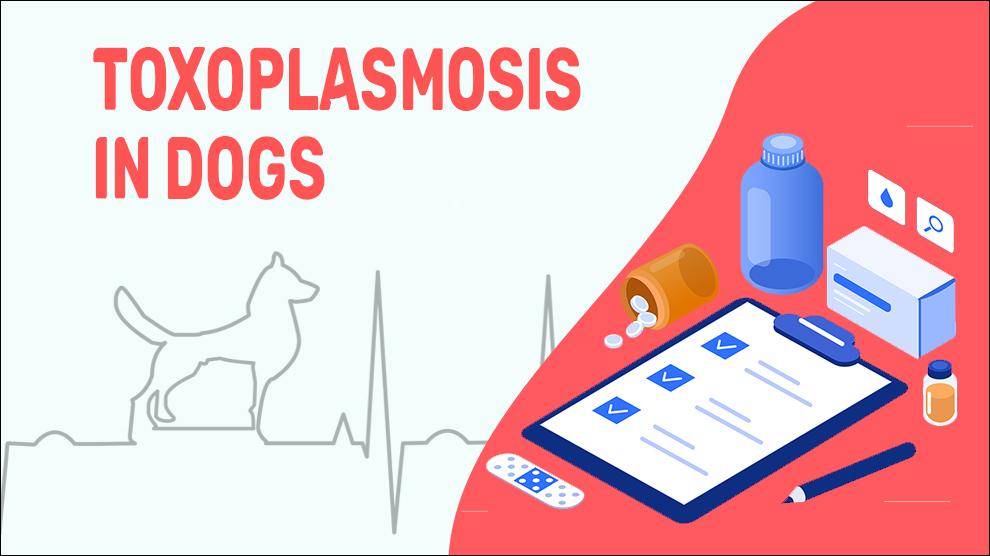What Is Toxoplasmosis In Dogs?
Toxoplasmosis is an opportunistic parasitic infection of dogs caused by the apicomplexan protozoan parasite Toxoplasma gondii resulting in neuromuscular, respiratory, and gastrointestinal infection. These extremely well-adapted microbes can transmit a disease to any endotherms or homeothermic animals (warm-blooded animals), but cats are the only known primary or definitive hosts. Dogs are not primary hosts and they can contract the disease. This indicates that the pathogen can finish its lifecycle within a dog’s body and shed through its feces.
Canines can ingest Toxoplasma gondii by ingesting rodent feces or eating contaminated meat, vegetables, fruits, or rooting in infected soil. There are acute and chronic forms of toxoplasmosis, in which the acute form is more symptomatic than the chronic form, which is usually a substandard disease devoid of any clinical signs.
The disease affects mostly puppies and Healthy adult dogs generally remain asymptomatic. Puppies develop fever, respiratory distress, diarrhea, and other concerning symptoms. Sometimes, Toxoplasma has associated with infections such as ehrlichiosis or with canine distemper.
There are no reports of zoonotic transmission documented from meat consumption, insect bites, and bites of other Toxoplasma-infected dogs.
Symptoms Of Toxoplasmosis In Dogs
- Fever
- Malaise
- Muscle weakness
- Breathing problems such as shortness of breath
- Inflammation of eyes/ tonsils
- Diarrhea
- Weight loss
- Intermittent dyspnea
- Loss of appetite
Treatment Options For Toxoplasmosis In Dogs
Acute toxoplasmosis: Sulfadiazine (Tribrissen, Equisul-SDT), pyrimethamine (Daraprim), and Clindamycin (Antirobe, Clintabs, ClinDrops, Cleocin)
Chronic or fetal toxoplasmosis: No particular medication is available
Anti-diarrheal agents: Metronidazole (Flagyl), loperamide (Imodium AD), Pepto-Bismol, Pepcid-AC (Famotidine)
Supportive care such as IV fluids and iron supplements
Home Remedies For Toxoplasmosis In Dogs
- Mix Apple Cider Vinegar with equal amounts of water and massage the dog’s coat. Alternatively, you can use tea tree oil, oregano oil, or colloidal silver.
- Foods that fight yeast Infections: Treats containing Pau D-Arco, olive leaf, caprylic acid.
- Add Probiotics foods to your dog’s meal
How To Prevent Toxoplasmosis In Dogs?
- Unfortunately, we cannot get rid of these parasites from the environment as they are prevalent.
- Avoid microbial Hotspots are overgrown bushes, foliage-filled areas, wooded areas, hunting areas, and camps. Moreover, if your dog's immune system is already compromised, avoid walks in these high-risk areas.
- Keep your dogs away from construction sites or overturned agricultural areas.
Affected Dog Breeds Of Toxoplasmosis
- There is no breed predisposition.
- Outdoor dogs, Sporting dogs, hunting dogs, and hound breeds.
Causes And Types For Toxoplasmosis In Dogs
1. Causes:
- Toxoplasmosis is considered an opportunistic pathogen, and dogs that have compromised/ suppressed immune systems are highly vulnerable.
- Outdoor dogs living in endemic regions are at higher risk.
- Hunting and sporting dogs in close proximity to leaf foliage areas, gardens, agricultural areas, and overturned soil (i.e., farms, and construction sites) seem to be predisposed to the disease.
- When the dogs inhale the microscopic spores that are shed by these parasites in the soil, they elude or bypass the dog’s protective respiratory mechanisms and can cause infection.
2. Types:
Acute Toxoplasmosis: This has a sudden onset, is clinically significant, and has lasting effects.
Chronic toxoplasmosis: This is late in onset, clinically asymptomatic but sometimes chronic conditions chronic condition may suddenly present with acute symptoms.
Fetal or congenital toxoplasmosis: Congenital infection in puppies occurs mostly after primary infection of pregnant dogs. This is very rare in dogs but in cats, this is more common.
3. Mortality:
Toxoplasmosis is a critical disease in puppies with severe complications and a high case fatality rate. Not surprisingly, disseminated infection also has a high mortality rate.
4. Diagnosis:
- Blood/urine cultures
- Skin lesions biopsy
- A culture of eye/nose discharge
- Specific blood tests to detect fungus
- X-rays, ultrasound, or CT scan
5. Prognosis:
The Toxoplasmosis prognosis is usually good with proper treatment. Mostly, dogs getting treatment will recover within 2 or 3 weeks. Disseminated Toxoplasmosis prognosis is guarded due to the spread of infection to other organs.
When To See A Vet For Toxoplasmosis In Dogs?
- Fever
- Malaise
- Muscle weakness
- Breathing problems such as shortness of breath
- Inflammation of eyes/ tonsils
Food Suggestions For Toxoplasmosis In Dogs
- Whole, unprocessed foods / Semi-Homemade Food / Low-carb dog food
- Vitamins: Broccoli, Brussel sprouts, spinach, kale, papaya, strawberries, and pineapple
- Add Probiotics, digestive enzymes, and/or oregano or basil
- Chicken soup bone broth (or use lamb/beef bones)
- Green vegetables: Cauliflower, cabbage, cantaloupe, Brussel sprouts, spinach, Kale, and silver beets
- Beef liver, Mutton Liver, lean meats, raw egg yolk, canned sardines, salmon, pumpkin, and green vegetables
Conclusion
While the possibility to contract Toxoplasmosis from your dog is potentially not possible, it is less likely if you practice good personal hygiene.
Only a Fewer percentage of the affected dogs relapse after treatment is finished. Never allow your pet from wandering freely in suspected microbial populated regions such as places with high leaf litter and grassy forested pathways.

















